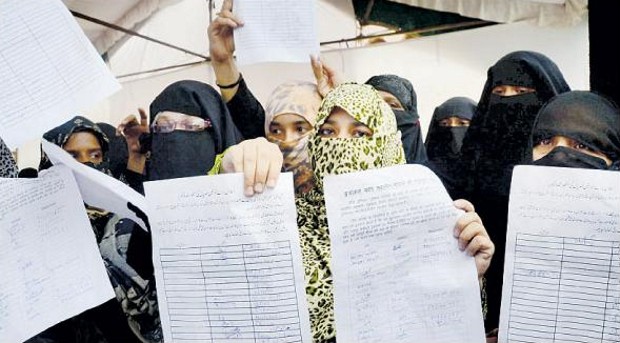Plan to flood offices of the President, PM, Chief Justice, Law Minister and Law Commission with resolutions passed at Muslim conferences all over India opposing any change in Muslim Personal Law

Image: Inquilab Urdu
At a public meeting of the women’s wing of the All India Muslim Personal Law Board (AIMPLB) held in Bhopal on Monday, it was “unanimously” resolved that any interference in Shariah laws is unacceptable to Muslim women.
Signed copies of the resolution passed at the women’s meeting in this regard were handed over to the AIPMLB president, Maulana Rabe Nadvi and general secretary Maulana Wali Rahmani.
The Times of India has quoted a Board member, Maulana KR Sajjad Nomani as saying the AIMPLB may hold a “referendum” to seek Muslim women’s views on instant triple talaq. According to the maulana, this is in response to the observation by the constitutional bench that a majority of Muslim women were opposed to instant triple talaq.
On Monday, the concluding day of the three-day meet of the executive committee of the AIMPLB it was noted that while on one hand the constitution bench of the Supreme Court affirmed constitutional protection to Muslim personal law, on the other it has set aside instant triple talaq practice which is an integral part of the Muslim Personal Law.
Responding to the separate judgment of Justice Kurian Thomas who held that instant triple talaq was “un-Quranic”, the Board members claimed that one, the Quran does talk about triple talaq and two, Shariah is based not on the Quran alone but rests on four pillars: Quran, Hadith, Ijma (consensus) and Qiyas (analogical reasoning).
A resolution passed at the Board’s concluding session said: “While respecting the verdict of the Supreme Court the AIMPLB is constrained to state that this verdict is not in accordance with Muslim Personal Law. Besides, the verdict also impacts negatively on the freedom of religion which the Indian Constitution guarantees to followers of all religions.
“In view of this, the AIMPLB has decided that because the issue concerns women, it will organise small and large conferences across the length and breadth of the country to familiarize women and men who are unaware about Shariah laws. At each such conference, resolutions will be passed copies of which will be posted to the President, Prime Minister, Chief Justice of Supreme Court, Union Law Minister and the Law Commission”.
The resolutions will state and affirm that Muslim men and women have full faith in Shariah laws and because talaq is also a part of Shariah laws they consider any external restrictions on it as a denial of their right to religion. In addition, the resolutions will demand that the currently existing right to follow and practice Muslim Personal Law be not meddled with in any manner.
Before the passage of the Board’s resolution, following a public meeting of Muslim women at Bhopal’s Iqbal maidan, a 50-member delegation led by Dr Asma Zahra presented a copy of the resolution passed at their meeting to the AIMPLB president, Maulana Rabe Nadvi and general secretary, Maulana Wali Rahmani.
The women’s resolution stressed that they fully abide by Shariah laws and any change in the same is not acceptable to them. Dr Zahra told the media that the proposed meetings of Muslim men and women across the country will be executed with the same fervor as the earlier signature campaign opposing any change in Muslim personal law.